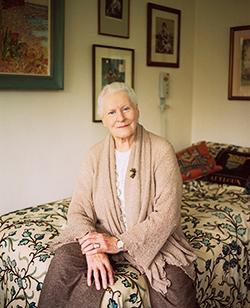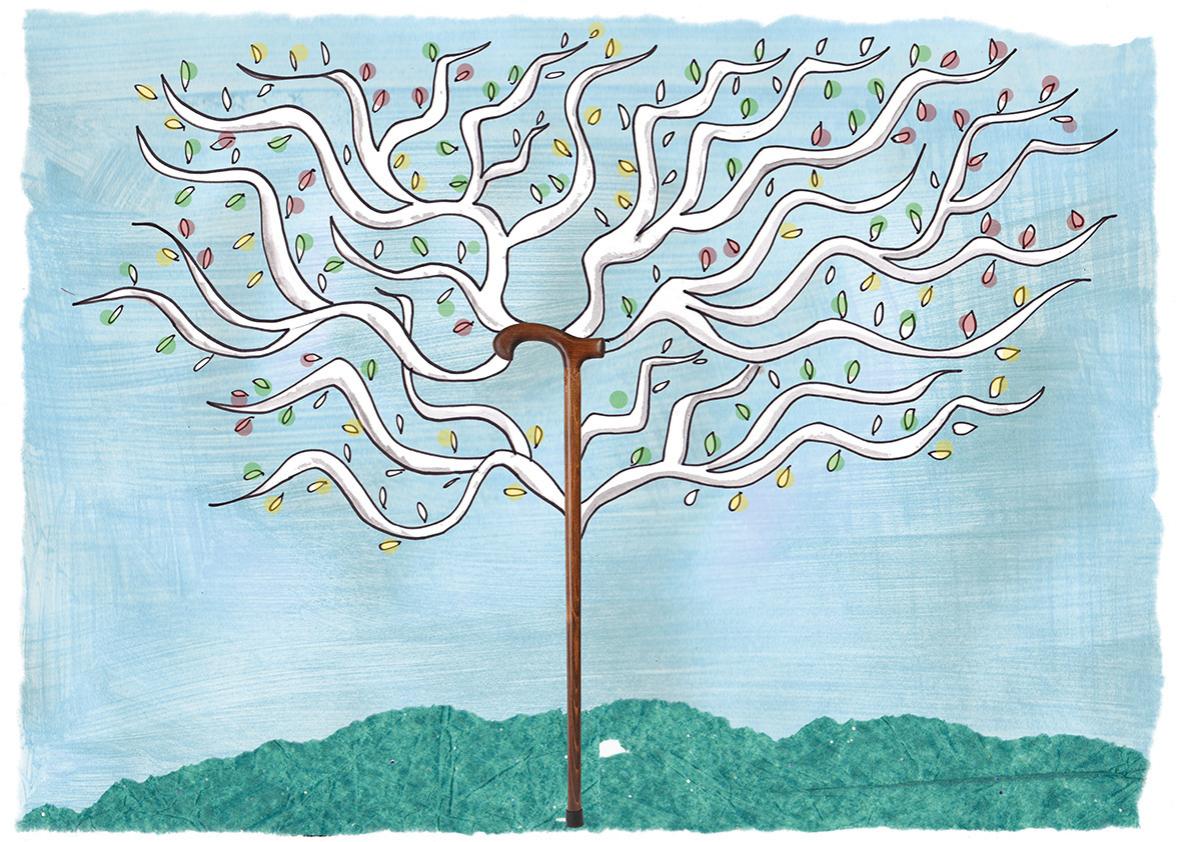One of the more frustrating aspects of clocking several decades on this planet is that while it teaches you a lot, what it teaches is nearly impossible to impart in words. Life turns out to be a learn-as-you-go affair, which is one reason why the advice old people offer seems so banal, the stuff of regimens and cliché: Use sunscreen, never go to bed angry, etc. Every once in a while, a very old person will suggest what feels most true: Aging well is largely a process of recognizing what you don’t need to worry about, one thing at a time, until, presumably, you winnow it down to life itself and find you can easily let that go too.
But what still counts in the handful of years up until that point? On that theme, no one writes better than Diana Athill. At the age of 98, she has just published another collection of personal essays, the jauntily titled Alive, Alive Oh!. Athill’s previous essay collection, Somewhere Towards the End, became a best-seller after it was published in 2008. Athill was just turning 90 then, and it must have been sweet indeed. She’d worked in publishing in Britain, ushering into print such celebrated authors as Philip Roth, John Updike, Simone de Beauvoir, and Margaret Atwood. Although previous memoirs had been well-received, Somewhere Towards the End made her a literary star in her own right. She was always a talent, but in her ninth decade, her gift was distilled and purified.
This is not the case with 95-year-old Roger Angell, happily ensconced at the New Yorker for more or less his entire career. (Angell’s mother, Katharine Sergeant Angell White, was the magazine’s first fiction editor, and his stepfather, E.B. White, was E.B. White.) This Old Man, a collection of Angell’s writings for the New Yorker and a few other publications, appeared late last year, and in it the old trouper’s skills are undiminished, but also not particularly enhanced by the perspective of years. Angell is a master of what New Yorker editors once referred to as the “casual”—short, occasional essays. A lifetime of producing these observant, often topical, and New York–centric pieces has instilled certain habits, and Angell has no particular reason to unlearn them now. He does what he has always done. But the result—wry, self-deprecating and ever anxious not to outstay its welcome—tends to deliberately skim the surface.

Photo by Eva Vermandel
Only one piece, the title essay, focuses on what it’s like to be in one’s 90s, and the difference between Angell’s account of his aging and Athill’s is the difference between excellent dinner party patter and actual confidences. Though Angell’s essay does describe the elderly person’s burden in honoring the dead, who number among them Carol, Angell’s wife of 48 years, it begins, alas, with a list of physical ailments. Angell plays this mostly for laughs—“I’ve become sort of a table potato, unalarmed by the X-ray cameras swooping eerily about just above my naked body”—and gamely claims that a newly acquired cane “gives me a nice little edge when hailing cabs.”
This litany of aches, pains, and more serious health woes is what Ann Burack-Weiss, a former gerontological social worker and the author of The Lioness in Winter: Writing an Old Woman’s Life (also published last fall) used to call “the organ recital.” Burack-Weiss and her colleagues would wait patiently as their elderly clients trudged through the routine, then steered the conversation on to something more constructive. Now that she herself is old, Burack-Weiss thinks she could have been more empathetic back then, and perhaps rightly so. But readers are not angels of mercy, and no matter how chipper the delivery, the organ recital is the least interesting thing to read about aging.
Yet it can be difficult for even a great writer to face up to this subject. The Lioness in Winter recounts Burack-Weiss’ coming to terms with life past 70, a quest she pursued by immersing herself in the work of several old female writers she regards as adepts: May Sarton, M.F.K. Fisher, Toni Morrison, Colette, Doris Lessing, and a dozen or so others. Then there was Joan Didion, who disappointed Burack-Weiss in a public appearance, where Didion read haltingly after being helped to the dais, “small, frail, expressionless; leaning heavily on the man who guided her to the chair.” The performance was a “pretense,” Burack-Weiss felt, in which the need for the walker or wheelchair “that was probably waiting off-stage” and for a large-text manuscript were denied. “The stigma of old age and the desire to ‘pass’ in a society that honors youth for youth’s sake makes cowards of us all,” she writes, even of a writer hailed for her “ability to probe the dark places of aging.”
Athill, by contrast, says goodbye to all that. Her essays are sidewinders. They will seem to be toddling along as breezily as Angell’s, then make a radical perpendicular move and end up someplace alarming and tremendous. She is the queen of the killer closing sentence, a worthy title for a woman approaching her own. In “A Life of Luxuries,” Athill recalls a history of her outfits, beginning with the perfect ones her mother sewed for her as a girl. This is a deceptively frivolous brief, as it takes her through the deprivations of World War II, when she wore “two tweed suits and little else,” and the counterculture of the 1960s, up to the age of 95, when “one’s idea of luxury shifts away from clothes.” Then comes this:
But my main luxury now is something which many misguided old people dread: the wheelchair. They think submitting to it is humiliating, and they are wrong. Nothing could be more deliciously luxurious than being pushed around a really thrilling and crowded exhibition in a wheelchair. The crowd falls away on either side like the Red Sea parting for the Israelites, and there you are, lounging in front of the painting of your choice in perfect comfort. I shall never forget the first time I fully realized how marvelous this can be. It was in front of Matisse’s red Dance, and I have never enjoyed a great painting more intensely.
Alive, Alive Oh! includes Athill’s radiant essay on her girlhood visits to her maternal grandparents’ stately Georgian home in Norfolk, a rare contemporary first-hand recollection of a lost way of life. (Although Athill’s parents had to watch their pennies, her grandparents employed a groom and chauffeur.) She was presented at court, but grew up to lead a highly unconventional love life, and in “This Bit Ought Not to Be True,” she recalls how a memoir she wrote on that subject distressed her genteel mother. Their solution to this disagreement was to simply not talk about it, which Athill at first found ridiculous, then comic, and then, finally “a very successful way of dealing with a difficult problem. You have a daughter whom you love, she does something you wish very much she hadn’t done, but you want to go on loving her in spite of it.” The essay ends with Athill observing that this strategy really works. “My mother and I grew closer and closer. There are no memories that I value more than that of the almost flame of love which lit her eyes when she opened them and saw me bending over her deathbed.” That one knocked the breath out of my lungs.
For Athill, old age means dwelling serenely in paradox and not apologizing for it. She never married—although she had a long, complex domestic relationship with the Jamaican playwright Barry Reckford—and, at 43, she became pregnant and decided to keep the child. She anticipated motherhood with joy, but the pregnancy miscarried, triggering a life-threatening hemorrhage, a crisis she recounts in detail. When she woke up in the hospital afterward, she was overjoyed to have survived and, to her astonishment, only briefly mourned the baby. Another of her poleaxing final sentences: “The truth was that I loved being alive so much that not having died was more important to me by far than losing the child: more important than anything.”
The essays in Alive, Alive Oh! resolve in a stubbornly untidy fashion; Athill rejects the unspoken, oppressively conventional “wisdom” that dominates the personal essay today. “My two valuable lessons are: avoid romanticism and abhor possessiveness,” she writes, in full, impish knowledge that is it impossible to follow such advice unless one is already temperamentally so inclined and that furthermore, no one—especially the young—wants to hear that they should be less romantic. “I have a prosaic personality,” Athill explains, before launching into the story of her doomed wartime affair with an Irish major stationed in her grandparents’ commandeered house. He was fortyish and married, she was on the rebound of her first great heartbreak. She didn’t expect him to divorce his wife and marry her, although she would have said yes if he had. And if he had been so foolish, then “I would have become a schoolmaster’s wife. And that, very probably, would have ended in disaster.”
She ought to have been sensible and renounced him, but she did not, and only her major’s own better judgment allowed her to escape the catastrophe of marrying the man she loved. Is she sorry? No. “Everything I say about how my life developed is true, but still, without the memory of that passion, it would have been much the poorer. So much for the wisdom of old age!”
Perhaps, though, this also the apex of its wisdom: Knowing that, in retrospect, the stupidest mistakes you’ve made are also often the very ingredients that give a long life its piquancy. They may be awful at the time, but they’re delicious when decanted later. Athill is a connoisseur of memory the way other people savor wine, and the best vintages are never entirely smooth. Her advice may be unfollowable, and her example only slightly less so, but the fruit of it is literature, that most unaccountable of human creations, and like Athill’s favorite paintings, her essays “make you see, when you leave their presence, that everything has become more alive.”
—
Alive, Alive Oh!: And Other Things That Matter by Diana Athill. W.W. Norton.
This Old Man: All in Pieces by Roger Angell. Doubleday.
The Lioness in Winter: Writing an Old Woman’s Life by Ann Burack-Weiss. Columbia University Press.
See all the pieces in the Slate Book Review.
